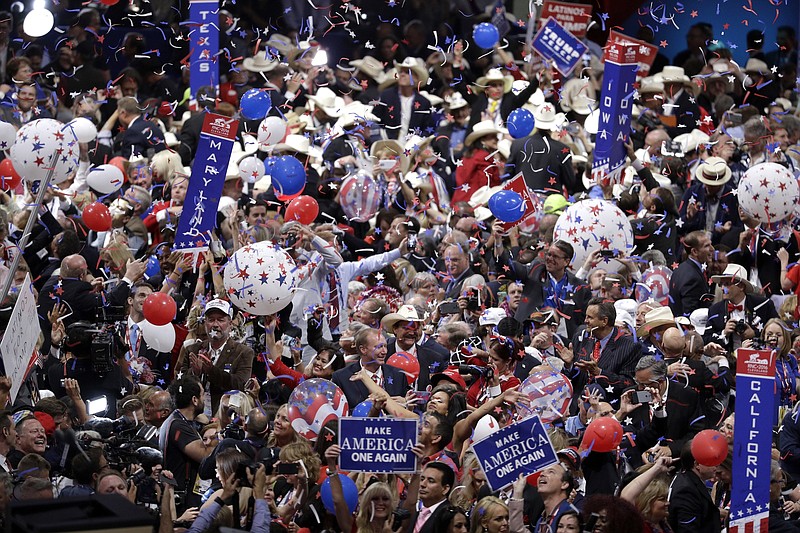"Tennessee, the state that sent three previous men to the White House, the state that proudly is called the home of country music, the state that claims American icon Dolly Parton, the state that gave us the Memphis blues ... is thrilled to give all of its votes to ..."
If the above type of recitation is at all familiar to you, you have probably watched or even attended a national political convention. They've been a staple of America life since 1832 for Democrats and 1856 for Republicans. But this year they'll disappear like the Columbus statue did in Chicago's Grant Park Thursday night.
And if we had to guess, we'd say they'll never be back the way they were through 2016, days of gatherings of the faithful to hear about party platforms that are history once the convention is gaveled to a close, to hear speeches from a transgender Republican or a pro-life Democrat whose exhortations will immediately be forgotten by those in charge and to hear the coronations of candidates who already have received millions of dollars in free publicity from news networks by the time they reach their bully podiums.
President Trump made it official Thursday, calling off the public portion of the Republican National Convention scheduled for next month in Jacksonville, Florida, out of an abundance of caution over the coronavirus. The GOP gathering already had been moved from Charlotte, North Carolina, for the same reason, but now the plug's been pulled completely.
Democrats had already sacked their convention, citing the virus. But it's actually a perfect scenario for them this year. With their presumptive nominee a 77-year-old career politician with uber baggage and an increasing penchant for gaffes, a scripted, virtual acceptance of the nomination now set for next month will serve them well.
Trump is likely to schedule something similar, though plans haven't been announced.
The truth, though, is that the conventions have long outlived their usefulness. Sure, they exhort party denizens to rally more tightly around their nominees, but they no longer select nominees, the vice presidential pick is no longer part of the activities, and whatever the nominees say in their acceptance speeches is nothing new - they've been saying it for months.
The last convention with more than one ballot was 68 years ago in 1952, broadcasters have done their own delegate counts to supersede the roll call of states for more than 50 years, and the vice presidential selection has been made ahead of the convention for more than 30 years.
No one younger than the baby boomer generation is likely to remember that all three broadcast networks, ABC, CBS and NBC, used to devote some daily but always nightly, gavel-to-gavel coverage of the conventions, sometimes, as with the Democrats in 1972, going well past midnight. Today's generation would find it mind-numbingly dull, but lovers of all things politics gave the conventions solid TV ratings.
The highlight of every television-era convention has been the acceptance speech when the soaring rhetoric, the podium-pounding, and the post-speech gathering of smiling candidate families amid confetti and balloons make a partisan believe anything could happen in the election - no matter what predictions were.
For instance, we recall watching the 1988 Democratic convention speech and feeling almost sure (and unhappy) the next president would be Michael Dukakis but then seeing the Republican convention several weeks later and believing it was possible the presidency might go (happily) to George H.W. Bush.
The conventions are so scripted that little doesn't go according to plan, but we recall nominee Gerald Ford calling defeated candidate Ronald Reagan to the stage to say a few words at the 1976 Republican convention (and presaging Reagan's 1980 nomination after Ford lost); of Ford reportedly accepting, and then declining, Reagan's offer to be vice president on the 1980 ticket; and President Jimmy Carter desperately trying to track down defeated candidate Ted Kennedy at the 1980 Democratic convention in order to be seen shaking his hand.
Networks in recent years have televised less and less of the conventions because so few people care. They already know what they believe, or, increasingly, what they are told they should believe. It's a good time to cut the cord.
If the future parties are smart, perhaps they'll convince the networks to broadcast a couple of hours one night for a nominee speech, sort of like the rallies then-President Barack Obama had and now Trump has. Or, lacking that, the parties can buy the time for a one-night, prime-time rally.
On the other hand, 2024 could bring a siren song for the conventions, especially if no incumbent is on the ballot. Even so, the parties should look away, grateful for a storied political history but needing to deal with 21st-century realities.
